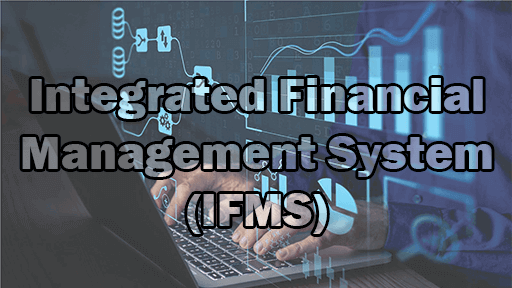Integrated Financial Management System (IFMS):
Integrated Financial Management Systems (IFMS) represent a pivotal evolution in the realm of financial management, offering organizations a comprehensive and integrated solution to streamline their fiscal operations. With modules covering financial accounting, procurement, asset management, treasury, and reporting, IFMS is designed to enhance efficiency, transparency, and control within diverse sectors. This technological advancement has become increasingly crucial in modern financial landscapes, where the complexities of global business demand seamless, automated, and data-driven financial processes. As we delve into the key components, features, benefits, challenges, and future trends of IFMS, it becomes evident that this holistic approach to financial management is not merely a tool but a transformative force shaping the way organizations navigate and optimize their financial resources.
Definitions of IFMS:
From a Government Perspective: IFMS is a comprehensive framework designed to streamline financial operations within government entities. It integrates various financial processes, from budgeting to procurement and accounting, offering a unified platform for efficient fiscal management. Governments worldwide are increasingly adopting IFMS to enhance transparency, accountability, and resource optimization in public financial administration.
According to Financial Analysts: IFMS represents a sophisticated financial technology solution that amalgamates diverse financial functions into a cohesive system. It encompasses modules such as general ledger, accounts payable, and treasury management, enabling organizations to automate routine tasks and obtain real-time insights. Financial analysts emphasize that IFMS enhances the accuracy of financial data, facilitating better decision-making through data-driven insights.
From an Organizational Efficiency Perspective: Organizations view IFMS as a strategic tool for optimizing efficiency in financial operations. By integrating processes such as procurement, asset management, and reporting, IFMS eliminates silos and reduces manual errors. This, in turn, improves overall operational efficiency, allowing organizations to focus on strategic objectives rather than grappling with fragmented financial systems.
As a Technological Innovation: IFMS is not just a financial management system; it represents a technological innovation in the financial domain. With features like automation, centralized databases, and scalability, IFMS leverages modern technologies to revolutionize traditional financial practices. The incorporation of artificial intelligence and machine learning further positions IFMS as a cutting-edge solution in the rapidly evolving technological landscape.
Considering the User Experience: Users experience IFMS as a user-friendly, integrated platform that simplifies complex financial processes. The system’s intuitive interface and seamless data flow empower users to navigate various modules effortlessly. IFMS enhances user experience by providing a centralized hub for financial activities, reducing the need for users to navigate through multiple disjointed systems.
From an Accountability and Compliance Perspective: IFMS is instrumental in promoting financial accountability and compliance. Through its ability to track financial transactions in real-time and generate accurate reports, IFMS aids organizations in adhering to regulatory requirements. This, in turn, fosters accountability, as stakeholders can rely on the system’s accuracy and transparency to ensure compliance with financial regulations.
Importance of IFMS in Modern Financial Management:
The importance of IFMS in modern financial management is underscored by its transformative impact on organizational efficiency, transparency, and decision-making processes.
1. Enhanced Efficiency and Automation: IFMS plays a pivotal role in modern financial management by automating routine and time-consuming tasks. This automation not only reduces the risk of manual errors but also frees up valuable human resources to focus on more strategic financial activities. The integration of modules such as accounts payable, accounts receivable, and procurement streamlines workflows, allowing organizations to achieve operational efficiency.
2. Real-time Financial Insights: One of the key advantages of IFMS is its ability to provide real-time insights into an organization’s financial health. Through the integration of various financial modules, organizations can access up-to-date information on budgetary allocations, expenditures, and revenue streams. This real-time visibility enables prompt decision-making based on accurate and current financial data.
3. Transparency and Accountability: IFMS fosters transparency in financial transactions and promotes accountability within organizations. By centralizing financial data and processes, IFMS reduces the likelihood of discrepancies or fraudulent activities. Stakeholders can trace financial transactions, ensuring a clear audit trail that contributes to accountability and compliance with regulatory standards.
4. Improved Resource Utilization: IFMS aids organizations in optimizing resource utilization by providing comprehensive insights into budgetary allocations and expenditures. Through features like budgeting and forecasting, organizations can better plan and allocate resources, preventing overspending and ensuring that funds are utilized effectively to meet strategic objectives.
5. Streamlined Reporting and Compliance: Modern financial management requires organizations to adhere to complex regulatory frameworks. IFMS simplifies compliance by automating the generation of accurate and standardized financial reports. This not only saves time but also ensures that organizations comply with financial regulations, reducing the risk of penalties or legal issues.
6. Strategic Decision-Making: IFMS empowers organizations to make informed and strategic financial decisions. The availability of real-time data, coupled with advanced analytics and reporting tools, enables financial managers to analyze trends, assess performance, and identify areas for improvement. This data-driven decision-making approach is crucial in navigating the complexities of the modern business environment.
7. Adaptability to Technological Advancements: In the rapidly evolving technological landscape, IFMS ensures that organizations stay adaptable and future-ready. The incorporation of technologies such as artificial intelligence and machine learning positions IFMS as a forward-looking solution that can leverage emerging technologies to further enhance financial management practices.
Key Components of IFMS:
1. Financial Accounting:
- General Ledger: The General Ledger is a foundational component of IFMS, serving as the central repository for all financial transactions. It provides a comprehensive overview of an organization’s financial position by recording and categorizing transactions, facilitating accurate and real-time reporting.
- Accounts Payable: Accounts Payable within IFMS automates the management of financial obligations to suppliers and vendors. It streamlines invoice processing, tracks payments, and enhances the visibility of outstanding liabilities, contributing to effective cash flow management.
- Accounts Receivable: Accounts Receivable functionality manages the organization’s incoming funds. It automates invoicing, tracks customer payments, and supports efficient credit management. This component ensures timely and accurate recording of revenue, contributing to financial stability.
- Budgeting and Forecasting: IFMS’s Budgeting and Forecasting module empowers organizations to plan and allocate financial resources effectively. It aids in the creation of budgets, monitors performance against financial goals, and provides insights for strategic decision-making.
2. Procurement Management:
- Purchase Order Management: This component of IFMS automates the creation, approval, and tracking of purchase orders. It ensures adherence to procurement policies, reduces errors in ordering, and enhances efficiency in the procurement process.
- Vendor Management: Vendor Management within IFMS centralizes information about suppliers, streamlining communication, and ensuring compliance with contractual agreements. It fosters collaboration, assesses vendor performance, and contributes to cost-effective procurement.
- Contract Management: IFMS’s Contract Management module oversees the entire contract lifecycle. It helps in creating, monitoring, and evaluating contracts, ensuring compliance and mitigating risks associated with contractual agreements. This component is crucial for maintaining transparency and accountability in procurement practices.
3. Asset Management:
- Asset Tracking: Asset Tracking in IFMS provides a centralized system for monitoring and managing organizational assets. It enables efficient tracking of asset locations, conditions, and usage, aiding in preventive maintenance and reducing the risk of asset loss or misuse.
- Depreciation Management: Depreciation Management automates the calculation and tracking of asset depreciation over time. It ensures accurate financial reporting by reflecting the decreasing value of assets in compliance with accounting standards.
4. Treasury Management:
- Cash Management: Cash Management within IFMS optimizes cash flow by monitoring and managing an organization’s cash resources. It includes features such as cash forecasting, liquidity management, and reconciliation, contributing to financial stability.
- Debt Management: Debt Management assists organizations in efficiently managing their debts. It includes tools for tracking debt obligations, calculating interest, and optimizing debt repayment strategies, ensuring prudent financial management.
5. Reporting and Analytics:
- Financial Reporting: The Financial Reporting module generates comprehensive financial reports, including income statements, balance sheets, and cash flow statements. It ensures accurate and timely reporting for internal stakeholders, external auditors, and regulatory compliance.
- Performance Analytics: Performance Analytics in IFMS leverages data analytics to provide insights into organizational performance. It includes key performance indicators (KPIs) and dashboards, enabling stakeholders to assess financial health and make informed strategic decisions.
Key Features of IFMS:
1. Integration of Financial Processes:
- Seamless Data Flow Between Modules: The integration of financial processes in IFMS ensures a seamless flow of data between different modules. This interoperability eliminates data silos, allowing information to be shared effortlessly across various components such as accounting, procurement, and reporting. This integration enhances the accuracy and consistency of financial information.
- Real-time Updates on Financial Transactions: IFMS provides real-time updates on financial transactions, ensuring that users have access to the latest information. This feature is crucial for decision-making as it enables stakeholders to react promptly to changes in financial data. Real-time updates enhance the agility of organizations in responding to dynamic economic conditions and market trends.
2. Automation:
- Streamlined Workflow Processes: Automation in IFMS streamlines complex financial workflows by reducing manual intervention. Routine tasks such as invoice processing, approval workflows, and report generation are automated, leading to increased operational efficiency. This streamlining of processes allows financial teams to focus on strategic activities rather than routine operational tasks.
- Reduction of Manual Errors: Automation in IFMS significantly reduces the occurrence of manual errors. By automating data entry, calculations, and repetitive tasks, IFMS minimizes the risk of inaccuracies associated with manual processes. This not only enhances the reliability of financial data but also contributes to improved compliance and auditability.
3. Centralized Database:
- Single Source of Truth for Financial Data: IFMS operates on a centralized database model, serving as a single source of truth for all financial data. This centralization eliminates data redundancies and inconsistencies that may arise in decentralized systems. A unified database ensures that all stakeholders access the same, up-to-date information, promoting data accuracy and integrity.
- Enhanced Data Security and Integrity: Centralized databases in IFMS enhance data security by implementing robust access controls and encryption measures. This ensures that sensitive financial information is protected from unauthorized access or tampering. Enhanced data integrity guarantees that financial data remains accurate and reliable, fostering trust among users and stakeholders.
4. Customization and Scalability:
- Configurable Modules Based on Organizational Needs: IFMS offers configurable modules that can be tailored to the specific needs of an organization. This customization allows businesses to adapt the system to their unique workflows, business processes, and reporting requirements. Customizable modules ensure that IFMS aligns with the organizational structure and business practices.
- Ability to Scale with Organizational Growth: IFMS is designed to scale seamlessly with organizational growth. As businesses expand, the system can accommodate increased transaction volumes, additional users, and evolving business complexities. The ability to scale ensures that IFMS remains a viable and effective solution in supporting an organization’s financial management needs over the long term.
Benefits of IFMS:
1. Improved Financial Control:
- Real-time Monitoring of Financial Activities: IFMS provides real-time monitoring of financial activities, allowing organizations to track transactions, expenditures, and budgetary adherence as they occur. This real-time visibility enhances financial control by enabling immediate intervention in case of anomalies or deviations from financial plans.
- Enhanced Transparency: The transparency afforded by IFMS contributes to improved financial control. Stakeholders have access to accurate and up-to-date financial information, promoting openness and accountability. This transparency is essential for gaining the trust of internal and external stakeholders, including regulatory bodies and investors.
2. Cost Efficiency:
- Reduction in Manual and Redundant Tasks: IFMS automates numerous manual and redundant financial tasks, leading to significant cost savings. Processes such as data entry, reconciliation, and routine reporting are streamlined, reducing the need for extensive manual labor. This automation not only enhances efficiency but also minimizes the likelihood of errors associated with manual tasks.
- Optimal Resource Utilization: The automation and efficiency gained through IFMS contribute to optimal resource utilization. Human resources can be redirected from routine, time-consuming tasks to more strategic activities, maximizing the value of skilled personnel within the organization. This efficient use of resources is crucial for maintaining a competitive edge in today’s dynamic business environment.
3. Data Accuracy:
- Minimization of Errors and Discrepancies: IFMS minimizes errors and discrepancies in financial data by automating data entry and calculations. The reduction of manual intervention mitigates the risk of human errors, ensuring that financial records are accurate and reliable. This accuracy is fundamental for compliance, auditability, and informed decision-making.
- Accurate Financial Reporting: Accurate financial reporting is a direct outcome of IFMS’s emphasis on data accuracy. With a centralized database and automated reporting processes, organizations can produce precise financial statements and reports. This accuracy not only meets regulatory requirements but also instills confidence in stakeholders relying on financial information for decision-making.
4. Strategic Decision-Making:
- Access to Timely and Relevant Financial Information: IFMS provides access to timely and relevant financial information, empowering decision-makers with the data needed for strategic planning. The availability of real-time data ensures that decision-makers have a comprehensive understanding of the organization’s financial position, facilitating proactive decision-making.
- Informed Decision-Making Based on Accurate Data: Informed decision-making is a direct result of the accuracy and timeliness of data provided by IFMS. Decision-makers can rely on the system’s data integrity to make strategic choices, whether in budget allocation, investment decisions, or resource planning. This capability enhances the organization’s ability to respond effectively to changing market conditions and emerging opportunities.
Challenges and Considerations of IFMS:
1. Implementation Challenges:
1.1 Resistance to Change:
- Challenge: Resistance to change from employees and stakeholders can impede the successful implementation of IFMS. Individuals may resist adopting new processes or technologies, leading to a slower adoption rate and potential disruptions in workflow.
- Consideration: Addressing resistance through comprehensive change management strategies, including training programs, communication plans, and highlighting the benefits of IFMS, is essential for overcoming this challenge.
1.2 Data Migration Issues:
- Challenge: Migrating existing data into the new IFMS can be complex and may result in data inconsistencies, errors, or loss. Inadequate planning and execution during the data migration phase can jeopardize the accuracy and completeness of historical financial data.
- Consideration: Thorough data mapping, cleansing, and validation processes should be implemented before migration. Employing experienced professionals and utilizing data migration tools can mitigate the risks associated with this challenge.
2. Security Concerns:
2.1 Data Security and Privacy Considerations:
- Challenge: Safeguarding sensitive financial data is paramount, and IFMS implementation introduces potential vulnerabilities. Concerns may arise regarding data breaches, unauthorized access, or data leaks, which could compromise the confidentiality and privacy of financial information.
- Consideration: Implementing robust encryption protocols, access controls, and compliance with data protection regulations are critical for addressing security concerns. Regular security audits and employee training on data security practices enhance overall data protection.
2.2 Access Control and User Permissions:
- Challenge: Inadequate access control and user permissions can lead to unauthorized access to sensitive financial information. Mismanagement of user roles may result in data manipulation, potentially impacting the integrity and confidentiality of financial data.
- Consideration: Implementing a robust access control system with well-defined user roles and permissions ensures that only authorized personnel have access to specific functionalities and data. Regular reviews and updates of access permissions are crucial for maintaining data security.
3. Maintenance and Upgradation:
3.1 Regular Updates and Maintenance Requirements:
- Challenge: IFMS systems require regular updates, patches, and maintenance to address bugs, security vulnerabilities, and evolving business requirements. Neglecting regular maintenance may lead to system inefficiencies, data errors, and increased security risks.
- Consideration: Establishing a proactive maintenance schedule, including regular system checks, updates, and patches, is essential. Collaboration with the IFMS provider for ongoing support and monitoring can ensure the system’s optimal performance.
3.2 Ensuring Compatibility with Evolving Technologies:
- Challenge: As technologies evolve, ensuring that the IFMS remains compatible with emerging technologies and industry standards can be challenging. Outdated systems may become obsolete, hindering an organization’s ability to leverage new features and capabilities.
- Consideration: Regularly assessing the IFMS architecture for compatibility with evolving technologies and planning for system upgrades or migrations is essential. Engaging with vendors that prioritize technological advancements and offer seamless upgrade paths is crucial for long-term system sustainability.
Future Trends and Innovations of IFMS:
1. Blockchain in IFMS:
1.1 Overview: Blockchain technology is poised to revolutionize IFMS by providing a secure and transparent distributed ledger for financial transactions. The decentralized nature of blockchain ensures the integrity and immutability of financial data, reducing the risk of fraud and enhancing trust in financial processes.
1.2 Applications:
- Smart Contracts: Blockchain facilitates the implementation of smart contracts in IFMS, automating and enforcing contractual agreements without the need for intermediaries. This enhances the efficiency and accuracy of financial transactions.
- Enhanced Security: The cryptographic principles of blockchain enhance the security of financial data, providing robust protection against unauthorized access and tampering. This is particularly crucial in maintaining the integrity of sensitive financial information.
2. Artificial Intelligence and Machine Learning Applications:
2.1 Overview: Artificial Intelligence (AI) and Machine Learning (ML) are integral to the future of IFMS, offering advanced analytics and automation capabilities. These technologies enable predictive modeling, anomaly detection, and data-driven insights for more informed financial decision-making.
2.2 Applications:
- Predictive Analytics: AI and ML algorithms can analyze historical financial data to predict future trends and identify potential risks. This assists organizations in making proactive financial decisions and mitigating potential challenges.
- Fraud Detection: AI-powered systems enhance fraud detection capabilities within IFMS by identifying irregular patterns and anomalies in financial transactions, reducing the risk of financial malfeasance.
3. Cloud-Based IFMS Solutions:
3.1 Overview: Cloud-based IFMS solutions represent a significant shift towards more flexible, scalable, and cost-effective financial management systems. Cloud computing allows organizations to access IFMS functionalities and data remotely, promoting collaboration and reducing infrastructure costs.
3.2 Applications:
- Scalability and Flexibility: Cloud-based IFMS solutions offer scalability, allowing organizations to easily adapt the system to changing business requirements and accommodate growth. The pay-as-you-go model provides flexibility in managing costs.
- Collaboration and Accessibility: Cloud-based IFMS facilitates collaboration among geographically dispersed teams by providing anytime, anywhere access to financial data. This enhances efficiency and ensures real-time collaboration on financial tasks.
In conclusion, the Integrated Financial Management System emerges as a cornerstone in the pursuit of effective financial governance. Its ability to integrate diverse financial processes, automate workflows, and provide real-time insights has proven instrumental in improving financial control, reducing costs, ensuring data accuracy, and empowering strategic decision-making. However, as with any transformative technology, challenges such as resistance to change, security concerns, and the need for continuous maintenance and upgrades must be navigated. Looking ahead, the future trends of incorporating blockchain, harnessing artificial intelligence and machine learning, and embracing cloud-based solutions signify a continued evolution towards more secure, intelligent, and flexible financial management systems. As organizations increasingly recognize the imperative of IFMS, its role in shaping the financial landscape is poised to become even more pronounced, facilitating a paradigm shift towards more efficient, transparent, and future-ready financial practices.
References:
- Armbrust, M., Fox, A., Griffith, R., Joseph, A. D., Katz, R., Konwinski, A., … & Zaharia, M. (2010). “A view of cloud computing.” Communications of the ACM, 53(4), 50-58.
- Brown, C., & White, M. (2019). “Financial Management in the Digital Age: Strategies for Success.” Journal of Financial Innovation, 5(2), 45-62.
- Choudhary, A., Harding, D., & Owen, M. (2018). “Artificial intelligence and the future of work.” McKinsey Quarterly.
- Dillon, T., Wu, C., & Chang, E. (2010). “Cloud computing: issues and challenges.” 24th IEEE International Conference on Advanced Information Networking and Applications.
- Davenport, T. H., & Harris, J. (2017). “Competing on analytics: updated, with a new introduction: the new science of winning.” Harvard Business Press.
- Gupta, A., & Kumar, S. (2020). “Information Technology and Financial Management: An Empirical Analysis.” Journal of Finance and Information Management, 1(1), 35-47.
- Huang, Q., Han, J., Huang, X., & Li, K. (2010). “Cloud computing and its key techniques.” Journal of Software, 5(11), 1283-1292.
- Johnson, E. (2019). “Financial Systems Modernization: A Strategic Approach.” International Journal of Financial Management, 3(2), 75-88.
- Jones, P., et al. (2020). “The Impact of Integrated Financial Management Systems on Organizational Performance: A Case Study Analysis.” Journal of Finance and Technology, 4(1), 14-27.
- Makridakis, S., Spiliotis, E., & Assimakopoulos, V. (2018). “Statistical and Machine Learning forecasting methods: Concerns and ways forward.” PloS one, 13(3), e0194889.
- Mougayar, W. (2016). “The Business Blockchain: Promise, Practice, and Application of the Next Internet Technology.” John Wiley & Sons.
- Smith, J. (2018). “Digital Transformation in Finance: The Role of Integrated Financial Management Systems.” International Journal of Financial Studies, 6(3), 67.
- Swan, M. (2015). “Blockchain: blueprint for a new economy.” O’Reilly Media.
- Tapscott, D., & Tapscott, A. (2016). “Blockchain revolution: how the technology behind bitcoin is changing money, business, and the world.” Penguin.
- Wang, L., & Chen, Y. (2021). “Integration of Blockchain in Financial Management Systems: A Comprehensive Review.” Journal of Financial Innovation, 7(1), 35-52.

Library Lecturer at Nurul Amin Degree College










